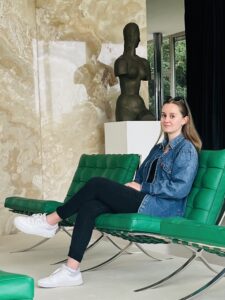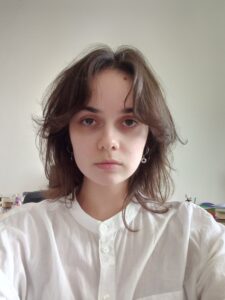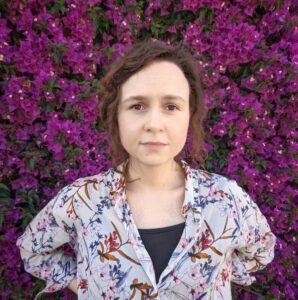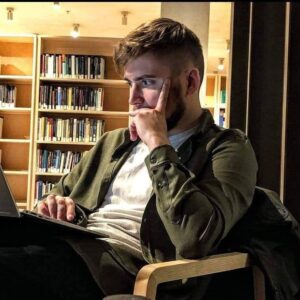“Theory and Practice of Architecture in Bratislava around 1800”
Research Area 3 – Objects, Traces, Mapping: Everyday Experience of Spaces
 Dominika Drobná is a PhD candidate at the Department of Art History, Faculty of Arts, Comenius University in Bratislava. Her dissertation, titled Theory and Practice of Architecture in Bratislava around 1800, contributes to Research Area 3 at CEFRES.
Dominika Drobná is a PhD candidate at the Department of Art History, Faculty of Arts, Comenius University in Bratislava. Her dissertation, titled Theory and Practice of Architecture in Bratislava around 1800, contributes to Research Area 3 at CEFRES.
The aim of the dissertation is to explore the relationship between architectural theory and practice in Bratislava between 1770 and 1830. The research began with a focus on the development of sacred architecture in western Slovakia during this period, particularly in the context of Theresian and Josephine reforms in the Church and education. These reforms significantly influenced architectural production and led to the discovery of a previously overlooked figure in architectural theory – Johann Nepomuk Schauff. Schauff worked for many years as a drawing teacher at the Normalschule in Bratislava, where he taught drawing to local craftsmen, including masons and stonemasons. These craftsmen increasingly participated in architectural design, particularly in religious and secular buildings, often in collaboration with Viennese architects. Schauff also developed his own theoretical ideas focused on the architecture of the Kingdom of Hungary and published several works in Bratislava related to this topic.
In addition to Schauff, the dissertation focuses on the work of architect Matthäus Walch, who was active in Bratislava especially during the 1770s. Walch played a key role in the construction of several aristocratic palaces, a theatre, and two Evangelical churches built even before the issuance of the 1781 Patent of Toleration.
The core objective of the dissertation is to address the theoretical and practical aspects of architecture – particularly sacred architecture – by analysing the work and ideas of these two important figures. It seeks to trace the stylistic development of architecture in Bratislava during a pivotal transition from the late Baroque to Classicism, and to demonstrate Bratislava’s significance as a secondary centre of architecture and art in the Habsburg monarchy and the Kingdom of Hungary.
The research methodology consists of several phases. The first involved heuristic and critical evaluation of existing literature. This was followed by in-depth analysis of primary historical sources, including archival documents, maps, architectural plans, and historical depictions, especially prints. Special attention is given to Schauff’s theoretical texts, whose interpretation helps illuminate broader architectural discourse around 1800.
The material basis of the study is formed by three key sacred buildings in Bratislava: The Large Evangelical Church (1774–1776), The Small Evangelical Church (1776–1777), and The Roman Catholic Church of St. Ladislaus (1830–1831). Notably, the two Evangelical churches were constructed before the Patent of Toleration in 1781. After a comprehensive analysis of the selected objects, the characteristic features of the architecture of the given period and region will be determined by comparison, and their development and style will be defined. In the final phase, I’m focusing on interpreting the acquired knowledge about sacred architecture. The aim is to highlight the broader context of the issue under investigation within the architecture of the selected period, not only in the territory of present-day Slovakia, but also in the context of the situation in Hungary, the Habsburg Monarchy and Europe.
Education
- From 2022 till present: PhD. candidate, Art studies, Department of Art History, Faculty of Arts, Comenius University in Bratislava
- 2021–2024: Master, Archaeology, Department of Archaeology and Museology, Faculty of Arts, Masaryk University in Brno
- 2019–2021: Master, Art History, Department of Art History, Faculty of Arts, Masaryk University in Brno
- 2016–2019: Bachelor, Art History, Department of Art History, Faculty of Arts, Comenius University in Bratislava
Recent publications
- Šintava a Sereď: premeny stredovekého hradu na renesančnú pevnosť a klasicistický kaštieľ: doklady vo svetle poznatkov z oblasti archeológie, dejín architektúry a pamiatkovej starostlivosti (Šintava and Sereď: transformation of a medieval castle into a Renaissance fortress and a Classicist manor house : evidence in the light of knowledge in the field of archaeology, history of architecture and monument care). In: Studia archaeologica Brunensia, roč. 29, č. 1, 2024, s. 109–151.
- Vila pro stavitele (Villa for the Builder). In: Tajemství české minulosti, č. 103, 2024, s. 24–27.
- Bratislavskí stavební majstri a ich vplyv na premeny mesta v druhej polovici 18. storočia (Bratislava’s Master Builders and Their Influence on the Transformation of the City in the Second Half of the 18th Century). In: Umělec a město: sborník příspěvků z odborné konference. Brno 2023, s. 91–104. ISBN 978-80-88145-69-1.
- Kontexte der Kunst um 1800 aus dem Gebiet der heutigen Slowakei (Contexts of Art around 1800 from the Territory of Present-Day Slovakia). In: Internationales Doktorand/innen Forum Kunstgeschichte des östlichen Europas [elektronický dokument]: Beiträge / Papers 2023. Berlin 2023, s. 1–2.
- Možnosti inšpirácie architektúrou (Posibilities of Inspiration through Architecture). In: Prostor Zlín, roč. XXX, č. 4, 2023, s. 43–47.
- Pressburger Baumeister Matthäus Walch a jeho stavebná činnosť v Bratislave (Pressburger Baumeister Matthäus Walch and his building activities in Bratislava). In: Kolbiarz Chmelinová, Katarína – Beňová, Katarína: Umenie a umělci v meste okolo roku 1800. Bratislava 2023, s. 86–112. ISBN 978-80-8127-388-9.
- Národní divadlo Nitranské župy (National Theatre of the Nitra County). In: Opuscula historiae artium, roč. 70, č.2, 2021, s. 142–153.
Participation in conferences
- November 2024: “National Styles in Architecture: The Formation of the Hungarian National Columns Order in the European Context“, paper presented in the conference Ex Arte: Fortresses, Bridges and Borders, Masaryk University, Brno
- October 2023: “Johann Nepomuk Schauff and the Study of the Hungarian National Style in Architecture“, paper presented in the conference Ex Arte: From Material to Theory, Palacký University, Olomouc
- October 2023: “Bratislava’s Master Buliders and Their Influence on the Transformation of the City“, paper presented in the conference The Artist and the City, Museum of Kroměříž
- May 2023: “Contexts of Art around 1800 from the Territory of Present-Day Slovakia“, short paper presented in the conference VIII. Internationales Doktorand*innenforum Kunstgeschichte des östlichen Europas, Humboldt-University, Berlin
- November 2022: “Pressburger Baumeister Matthäus Walch and his building Activities in Bratislava“, paper presented in the conference Art and Artists in the City around 1800, Comenius University, Bratisava
 Nina Papcunová is a doctoral student at the Institute of Slovak Literature of the Slovak Academy of Sciences in Bratislava. Her dissertation, entitled Nature in Modernism, contributes to CEFRES Research Area 3.
Nina Papcunová is a doctoral student at the Institute of Slovak Literature of the Slovak Academy of Sciences in Bratislava. Her dissertation, entitled Nature in Modernism, contributes to CEFRES Research Area 3.


